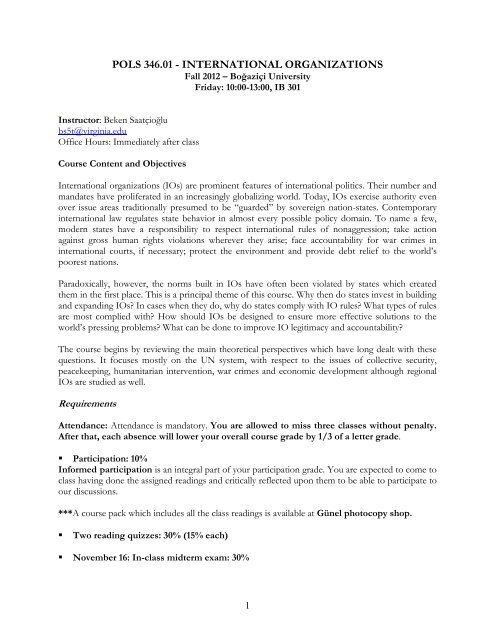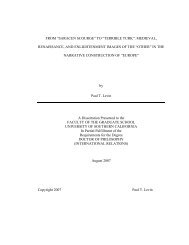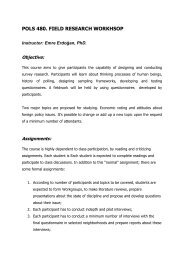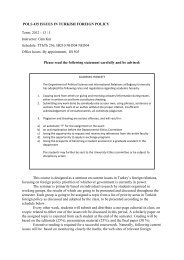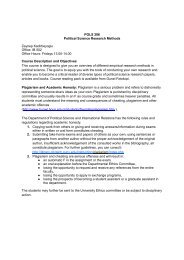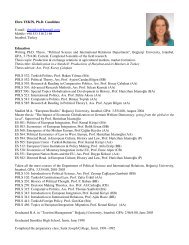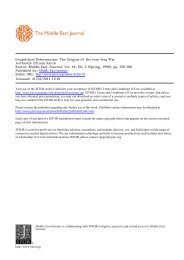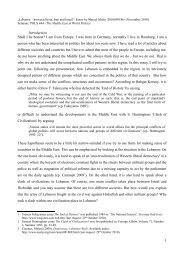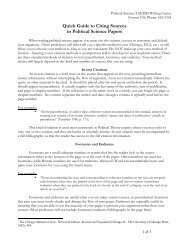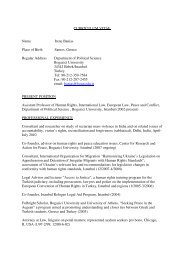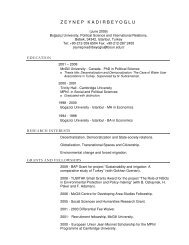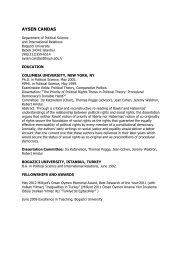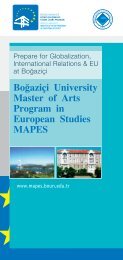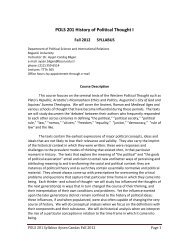International Organizations - Department of Political Science and ...
International Organizations - Department of Political Science and ...
International Organizations - Department of Political Science and ...
You also want an ePaper? Increase the reach of your titles
YUMPU automatically turns print PDFs into web optimized ePapers that Google loves.
POLS 346.01 - INTERNATIONAL ORGANIZATIONS<br />
Fall 2012 – Boğaziçi University<br />
Friday: 10:00-13:00, IB 301<br />
Instructor: Beken Saatçioğlu<br />
bs5t@virginia.edu<br />
Office Hours: Immediately after class<br />
Course Content <strong>and</strong> Objectives<br />
<strong>International</strong> organizations (IOs) are prominent features <strong>of</strong> international politics. Their number <strong>and</strong><br />
m<strong>and</strong>ates have proliferated in an increasingly globalizing world. Today, IOs exercise authority even<br />
over issue areas traditionally presumed to be ―guarded‖ by sovereign nation-states. Contemporary<br />
international law regulates state behavior in almost every possible policy domain. To name a few,<br />
modern states have a responsibility to respect international rules <strong>of</strong> nonaggression; take action<br />
against gross human rights violations wherever they arise; face accountability for war crimes in<br />
international courts, if necessary; protect the environment <strong>and</strong> provide debt relief to the world‘s<br />
poorest nations.<br />
Paradoxically, however, the norms built in IOs have <strong>of</strong>ten been violated by states which created<br />
them in the first place. This is a principal theme <strong>of</strong> this course. Why then do states invest in building<br />
<strong>and</strong> exp<strong>and</strong>ing IOs? In cases when they do, why do states comply with IO rules? What types <strong>of</strong> rules<br />
are most complied with? How should IOs be designed to ensure more effective solutions to the<br />
world‘s pressing problems? What can be done to improve IO legitimacy <strong>and</strong> accountability?<br />
The course begins by reviewing the main theoretical perspectives which have long dealt with these<br />
questions. It focuses mostly on the UN system, with respect to the issues <strong>of</strong> collective security,<br />
peacekeeping, humanitarian intervention, war crimes <strong>and</strong> economic development although regional<br />
IOs are studied as well.<br />
Requirements<br />
Attendance: Attendance is m<strong>and</strong>atory. You are allowed to miss three classes without penalty.<br />
After that, each absence will lower your overall course grade by 1/3 <strong>of</strong> a letter grade.<br />
• Participation: 10%<br />
Informed participation is an integral part <strong>of</strong> your participation grade. You are expected to come to<br />
class having done the assigned readings <strong>and</strong> critically reflected upon them to be able to participate to<br />
our discussions.<br />
***A course pack which includes all the class readings is available at Günel photocopy shop.<br />
• Two reading quizzes: 30% (15% each)<br />
• November 16: In-class midterm exam: 30%<br />
1
• In-class final exam: 30%<br />
***These requirements are final <strong>and</strong> will ultimately determine your overall grade in the class.<br />
There will be no additional assignments for those <strong>of</strong> you looking to increase their grades by<br />
the end <strong>of</strong> the semester.***<br />
***It goes without saying that students must show respect for the pr<strong>of</strong>essor <strong>and</strong> classmates. This<br />
means arriving to class a few minutes prior, avoiding distracting behaviors in class <strong>and</strong> turning <strong>of</strong>f<br />
cell phones. Excessive <strong>and</strong> repeated tardiness will not be tolerated. If you’re consistently late to<br />
class, you will not be allowed to attend.***<br />
***Recommendation letter policy: If you need a letter <strong>of</strong> recommendation from me, you should<br />
write a research paper (6-8 pages) so that I can assess your research <strong>and</strong> writing potential for<br />
graduate study. The paper should be submitted sufficiently in advance to give me enough time to<br />
write you a letter.***<br />
ACADEMIC HONESTY<br />
The <strong>Department</strong> <strong>of</strong> <strong>Political</strong> <strong>Science</strong> <strong>and</strong> <strong>International</strong> Relations has the following rules <strong>and</strong><br />
regulations regarding academic honesty.<br />
1. Copying work from others or giving <strong>and</strong> receiving answers/information during exams either<br />
in written or oral form constitutes cheating.<br />
2. Submitting take-home exams <strong>and</strong> papers <strong>of</strong> others as your own, using sentences or<br />
paragraphs from another author without the proper acknowledgement <strong>of</strong> the original author,<br />
insufficient acknowledgement <strong>of</strong> the consulted works in the bibliography, all constitute<br />
plagiarism.<br />
3. Plagiarism <strong>and</strong> cheating are serious <strong>of</strong>fenses <strong>and</strong> will result in:<br />
a) an automatic ―F‖ in the assignment or the exam<br />
b) an oral explanation before the <strong>Department</strong>al Ethics Committee<br />
c) losing the opportunity to request <strong>and</strong> receive any references from the entire faculty<br />
d) losing the opportunity to apply in exchange programs<br />
e) losing the prospects <strong>of</strong> becoming a student assistant or a graduate assistant in the<br />
department<br />
The students may further be sent to the University Ethics committee or be subject to<br />
disciplinary action.<br />
Please refer to the box below for a detailed explanation <strong>of</strong> what constitutes plagiarism.<br />
What is Plagiarism?<br />
Using someone else's ideas or phrasing <strong>and</strong> representing those ideas or phrasing as our own, either on purpose or<br />
through carelessness, is a serious <strong>of</strong>fense known as plagiarism. ―Ideas or phrasing‖ includes written or spoken material,<br />
<strong>of</strong> course—from whole papers <strong>and</strong> paragraphs to sentences, <strong>and</strong>, indeed, phrases—but it also includes statistics, lab<br />
2
esults, art work, etc. ―Someone else‖ can mean a pr<strong>of</strong>essional source, such as a published writer or critic in a book,<br />
magazine, encyclopedia, or journal; an electronic resource such as material we discover on the World Wide Web; another<br />
student at our school or anywhere else; a paper-writing ―service‖ (online or otherwise) which <strong>of</strong>fers to sell written papers<br />
for a fee.<br />
Let us suppose, for example, that we‘re doing a paper for Music Appreciation on the child prodigy years <strong>of</strong> the<br />
composer <strong>and</strong> pianist Franz Liszt <strong>and</strong> that we've read about the development <strong>of</strong> the young artist in several sources. In<br />
Alan Walker's book Franz Liszt: The Virtuoso Years (Ithaca: 1983), we read that Liszt's father encouraged him, at age<br />
six, to play the piano from memory, to sight-read music <strong>and</strong>, above all, to improvise. We can report in our paper (<strong>and</strong> in<br />
our own words) that Liszt was probably the most gifted <strong>of</strong> the child prodigies making their mark in Europe in the midnineteenth<br />
century—because that is the kind <strong>of</strong> information we could have gotten from a number <strong>of</strong> sources; it has<br />
become what we call common knowledge.<br />
However, if we report on the boy's father's role in the prodigy's development, we should give proper credit to Alan<br />
Walker. We could write, for instance, the following: Franz Liszt's father encouraged him, as early as age six, to practice<br />
skills which later served him as an internationally recognized prodigy (Walker, p. 59). Or, we could write something like<br />
this: Alan Walker notes that, under the tutelage <strong>of</strong> his father, Franz Liszt began work in earnest on his piano playing at<br />
the age <strong>of</strong> six (p. 59). Not to give Walker credit for this important information is plagiarism.<br />
Some More Examples:<br />
(The examples below were originally written by the writing center staff at an esteemed<br />
college; that institution has asked us to remove its name from this Web page.)<br />
The original text from Elaine Tyler May's ―Myths <strong>and</strong> Realities <strong>of</strong> the American Family‖:<br />
Because women's wages <strong>of</strong>ten continue to reflect the fiction that men earn the family wage, single mothers rarely earn<br />
enough to support themselves <strong>and</strong> their children adequately. And because work is still organized around the assumption<br />
that mothers stay home with children, even though few mothers can afford to do so, child-care facilities in the United<br />
States remain woefully inadequate.<br />
Here are some possible uses <strong>of</strong> this text. As you read through each version, try to decide if it is a legitimate use <strong>of</strong> May's<br />
text or a plagiarism.<br />
Version A:<br />
Since women's wages <strong>of</strong>ten continue to reflect the mistaken notion that men are the main wage earners in the family,<br />
single mothers rarely make enough to support themselves <strong>and</strong> their children very well. Also, because work is still based<br />
on the assumption that mothers stay home with children, facilities for child care remain woefully inadequate in the<br />
United States.<br />
Plagiarism.<br />
In Version A there is too much direct borrowing in sentence structure <strong>and</strong> wording. The writer changes some words,<br />
drops one phrase, <strong>and</strong> adds some new language, but the overall text closely resembles May‘ s. Even with a citation, the<br />
writer is still plagiarizing because the lack <strong>of</strong> quotation marks indicates that Version A is a paraphrase, <strong>and</strong> should thus<br />
be in the writer's own language.<br />
Version B:<br />
As Elaine Tyler May points out, ―women's wages <strong>of</strong>ten continue to reflect the fiction that men earn the family wage‖<br />
(588). Thus many single mothers cannot support themselves <strong>and</strong> their children adequately. Furthermore, since work is<br />
based on the assumption that mothers stay home with children, facilities for day care in this country are still ―woefully<br />
inadequate.‖ (May 589).<br />
Plagiarism.<br />
The writer now cites May, so we're closer to telling the truth about our text's relationship to the source, but this text<br />
continues to borrow too much language.<br />
Version C:<br />
3
By <strong>and</strong> large, our economy still operates on the mistaken notion that men are the main breadwinners in the family. Thus,<br />
women continue to earn lower wages than men. This means, in effect, that many single mothers cannot earn a decent<br />
living. Furthermore, adequate day care is not available in the United States because <strong>of</strong> the mistaken assumption that<br />
mothers remain at home with their children.<br />
Plagiarism.<br />
Version C shows good paraphrasing <strong>of</strong> wording <strong>and</strong> sentence structure, but May's original ideas are not acknowledged.<br />
Some <strong>of</strong> May's points are common knowledge (women earn less than men, many single mothers live in poverty), but<br />
May uses this common knowledge to make a specific <strong>and</strong> original point <strong>and</strong> her original conception <strong>of</strong> this idea is not<br />
acknowledged.<br />
Version D:<br />
Women today still earn less than men—so much less that many single mothers <strong>and</strong> their children live near or below the<br />
poverty line. Elaine Tyler May argues that this situation stems in part from ―the fiction that men earn the family wage‖<br />
(588). May further suggests that the American workplace still operates on the assumption that mothers with children stay<br />
home to care for them (589). This assumption, in my opinion, does not have the force it once did. More <strong>and</strong> more<br />
businesses <strong>of</strong>fer in-house day-care facilities.<br />
No Plagiarism.<br />
The writer makes use <strong>of</strong> the common knowledge in May's work, but acknowledges May's original conclusion <strong>and</strong> does<br />
not try to pass it <strong>of</strong>f as his or her own. The quotation is properly cited, as is a later paraphrase <strong>of</strong> another <strong>of</strong> May's ideas.<br />
September 28: Course overview <strong>and</strong> introduction<br />
October 5: What are international organizations? Why do they exist? What logics <strong>of</strong> action<br />
guide them?<br />
Karns <strong>and</strong> Mingst, ―The Challenges <strong>of</strong> Global Governance‖, p. 3-34 (in Margaret P. Karns <strong>and</strong><br />
Karen A. Mingst, <strong>International</strong> <strong>Organizations</strong>. The Politics <strong>and</strong> Processes <strong>of</strong> Global Governance, Boulder:<br />
Lynne Rienner Publishers, 2004).<br />
March, James G. <strong>and</strong> Johan P. Olsen, ―The Institutional Dynamics <strong>of</strong> <strong>International</strong> <strong>Political</strong> Orders‖,<br />
<strong>International</strong> Organization 52 (4) (Autumn 1998), p. 943-954.<br />
H<strong>of</strong>fman, Stanley ―World Governance: Beyond Utopia‖ Daedalus 132 (1) (Winter 2003), p. 27-35.<br />
October 12: Rationalist Approaches to <strong>International</strong> <strong>Organizations</strong>: Realism <strong>and</strong> Neoliberal<br />
Institutionalism<br />
Pease, Kelly-Kate, Chapter 3, ―Mainstream Approaches‖, p. 43-73 (in Kelly-Kate Pease, <strong>International</strong><br />
<strong>Organizations</strong>, Perspectives on Governance in the Twenty-First Century, Third Edition, New Jersey: Pearson<br />
Prentice Hall, 2008).<br />
Mearsheimer, John ―The False Promise <strong>of</strong> <strong>International</strong> Institutions‖, <strong>International</strong> Security 19 (3),<br />
(Winter 1994/95), p. 5-49 (read only p. 5-37).<br />
4
Keohane, Robert <strong>and</strong> Lisa Martin ―The Promise <strong>of</strong> Institutionalist Theory‖ <strong>International</strong> Security 20<br />
(1), (Summer 1995), p. 39-51.<br />
October 19: Sociological Approaches to <strong>International</strong> <strong>Organizations</strong>: Constructivism <strong>and</strong><br />
Organizational Theory<br />
Mearsheimer, John ―The False Promise <strong>of</strong> <strong>International</strong> Institutions‖, <strong>International</strong> Security 19 (3)<br />
(Winter 1994/95), p. 37-47.<br />
Wendt, Alex<strong>and</strong>er ―Anarchy is What States Make <strong>of</strong> it‖, (in Art <strong>and</strong> Jervis, eds., <strong>International</strong> Politics:<br />
Enduring Concepts <strong>and</strong> Contemporary Issues, 7 th edition, New York: Pearson/Longman, 2005), p. 61-68.<br />
Gheciu, Alex<strong>and</strong>ra ―Security Institutions as Agents <strong>of</strong> Socialization? NATO <strong>and</strong> the ‗New Europe‘‖,<br />
<strong>International</strong> Organization 59 (Fall 2005), p. 973-1012 (read only p. 973-1003).<br />
Barnett, Michael <strong>and</strong> Martha Finnemore, Rules for the World: <strong>International</strong> <strong>Organizations</strong> in Global Politics,<br />
(Ithaca: Cornell University Press, 2004), p. 1-10 <strong>and</strong> Chapter 2, p. 16-44.<br />
October 26: Religious holiday - No class<br />
November 2: History <strong>of</strong> <strong>International</strong> <strong>Organizations</strong>: Early IOs <strong>and</strong> the League <strong>of</strong> Nations<br />
Bennett, LeRoy <strong>and</strong> James K. Oliver, ―A Great Experiment: The League <strong>of</strong> Nations‖, p. 27-45 (in<br />
Bennett <strong>and</strong> Oliver, <strong>International</strong> <strong>Organizations</strong>: Principles <strong>and</strong> Issues, New Jersey: Prentice Hall, 2002).<br />
The Covenant <strong>of</strong> the League <strong>of</strong> Nations: http://avalon.law.yale.edu/20th_century/leagcov.asp.<br />
Wilson, Woodrow ―The Fourteen Points‖ (excerpts from Wilson‘s address to the U.S. Congress on<br />
8 January 1918).<br />
Carr, E.H. The Twenty Years‘ Crisis, 1919-1939 (New York: Harper <strong>and</strong> Row, 1964), p. 22-88.<br />
Make-up class: Date <strong>and</strong> time to be arranged: Post-World War II System: The United<br />
Nations <strong>and</strong> Collective Security<br />
****************Quiz at the beginning <strong>of</strong> class*************************************<br />
Pease, p. 22-29 <strong>and</strong> p. 103-109.<br />
UN Charter, Chapter VII, available at: http://www.un.org/aboutun/charter/index.html <strong>and</strong> UN<br />
Resolution 1441.<br />
Franck, Thomas M. ―What Happens Now? The UN after Iraq‖ <strong>and</strong> Harold Hongju Koh ―On<br />
American Exceptionalism‖, p. 376-393 (in Hathaway <strong>and</strong> Koh, Foundations <strong>of</strong> <strong>International</strong> Law <strong>and</strong><br />
Politics, New York: Foundation Press, 2005).<br />
Glennon, Michael ―Why the Security Council Failed‖, Foreign Affairs 82 (3) (May-June 2003).<br />
5
November 9: Peacekeeping <strong>and</strong> Humanitarian Intervention<br />
Karns <strong>and</strong> Mingst, ―Peacekeeping‖, p. 306-327.<br />
Barnett <strong>and</strong> Finnemore, ―Genocide <strong>and</strong> the Peacekeeping Culture at the United Nations‖, p. 121-<br />
155.<br />
―Convention on the Prevention <strong>and</strong> Punishment <strong>of</strong> the Crime <strong>of</strong> Genocide‖, available at:<br />
http://www.unhchr.ch/html/menu3/b/p_genoci.htm<br />
Report <strong>of</strong> the <strong>International</strong> Commission on Intervention <strong>and</strong> State Sovereignty, ―The Responsibility<br />
to Protect‖, p. XI-XIII, 11-13, <strong>and</strong> 29-37.<br />
November 16: MIDTERM<br />
November 23: NATO<br />
Pease, chapter 6, ―Regional Security‖, p. 139-156.<br />
Pattison, James ―Introduction‖, p. 1-4; Welsh, Jennifer ―Civilian Protection in Libya: Putting<br />
Coercion <strong>and</strong> Controversy Back into RtoP‖, p. 1-8; Bellamy, Alex ―Libya <strong>and</strong> the Responsibility to<br />
Protect‖, p. 1-7; Pattison, James ―The Ethics <strong>of</strong> Humanitarian Intervention in Libya‖, p.1-7;<br />
Chesterman, Simon ―Leading from behind‖, p. 1-7; Weiss, Thomas ―RtoP Alive <strong>and</strong> Well after<br />
Libya‖, p. 1-6, in Ethics <strong>and</strong> <strong>International</strong> Affairs 25 (3), Fall 2011.<br />
November 30: Human Rights Enforcement <strong>and</strong> Accountability for Crimes against<br />
Humanity<br />
Robertson, Ge<strong>of</strong>frey ―The <strong>International</strong> Criminal Court‖, p. 419-467 (in Robertson, Crimes Against<br />
Humanity. The Struggle for Global Justice, New York: The New Press, 2006).<br />
Kaye, David, ―Who‘s Afraid <strong>of</strong> the <strong>International</strong> Criminal Court?‖, Foreign Affairs, May/June 2011,<br />
Vol. 90 (3), p. 118-129.<br />
December 7: The UN System <strong>and</strong> Development<br />
Pease, chapter 8, ―Development‖, p. 192-224, <strong>and</strong> ―Marxism‖, p. 74-89.<br />
Stiglitz, Joseph, ―The Way Ahead‖, p. 214-252 (in Stiglitz Globalization <strong>and</strong> Its Discontents, New York:<br />
W.W. Norton & Company, June 2002).<br />
Rog<strong>of</strong>f, Kenneth ―The IMF Strikes Back‖, Foreign Policy 134 (January 2003), p. 38-46.<br />
Rog<strong>of</strong>f‘s open letter to Stiglitz, available at: http://www.imf.org/external/np/vc/2002/070202.htm<br />
December 14: European Union<br />
******************************Quiz at the beginning <strong>of</strong> class***********************<br />
6
Karns <strong>and</strong> Mingst, ―The European Union (EU)‖, p. 159-174.<br />
Grabbe, Heather ―Accession Conditionality <strong>and</strong> Its Implications‖, p. 7-38 (in Grabbe, The EU’s<br />
Transformative Power: Europeanization through Conditionality in Central <strong>and</strong> Eastern Europe, New York:<br />
Palgrave Macmillan, 2006).<br />
European Commission, ―Enlargement Strategy <strong>and</strong> Main Challenges 2006 – 2007, including<br />
annexed special report on the EU's capacity to integrate new members‖ (Brussels, 2006), skim p. 2-<br />
10, read carefully p. 15-24, available at:<br />
http://ec.europa.eu/enlargement/pdf/key_documents/2006/Nov/com_649_strategy_paper_en.pd<br />
f<br />
December 21: European Union <strong>and</strong> Turkey<br />
Muftuler-Bac, ―Turkey‘s Accession to the European Union: The Impact <strong>of</strong> the EU‘s Internal<br />
Dynamics‖, <strong>International</strong> Studies Perspectives, 2008 (9), p. 201-219.<br />
European Commission, ―Issues Arising from Turkey‘s Membership Perspective‖, pp. 3-20, 21-27<br />
(skim), 37-41, 46-53, available at:<br />
http://ec.europa.eu/enlargement/archives/pdf/key_documents/2004/issues_paper_en.pdf<br />
European Commission, Negotiating Framework, Luxembourg, 3 October 2005, available at:<br />
http://ec.europa.eu/enlargement/pdf/turkey/st20002_05_tr_framedoc_en.pdf<br />
7


